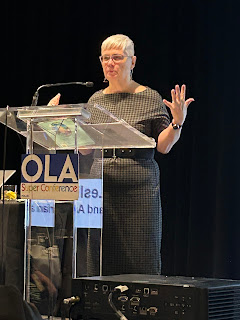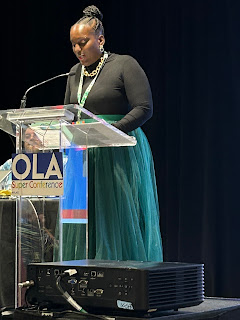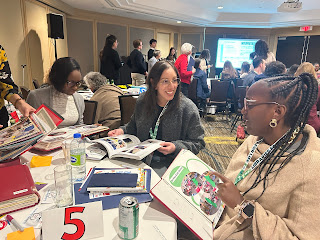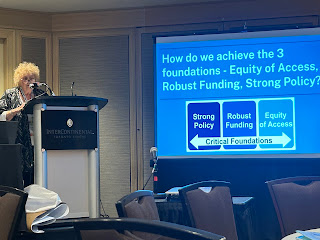No rest for the weary! (Or is it "no rest for the wicked!"?) Right after the Ontario Library Association Super Conference, we began another conference. Here are my thoughts from this event.
Treasure Mountain Canada 8
Foundations for SLLCs in Canada: A Framework for Success
Conference Reflections by Diana Maliszewski
Friday, January 31, 2025
6:00 p.m. - Welcome and Dinner
Summary: Joseph Jeffery, the chair of Canadian School Libraries, welcomed everyone to the event. Dinner was served to the assembly. I was grateful to have both my husband, James Maliszewski, and my principal, Troy Sotiroff, in attendance as my guests.
Media Artifacts:
7:15 p.m. - Keynote Speaker (Leslie Weir)
Summary: Leslie is the Librarian and Archivist of Canada. Her wide-ranging talk mentioned the importance of school libraries and the changing nature of the Archives of Canada. They are moving from their original home to share space with Ottawa Public Library. In Wendy Burch Jones' words, "it was about her journey into librarianship, the new National Library and Archives Building, and the right to read, punctuated with three personal stories, one from 60 years ago, one from 20 years ago, and one from 6 years ago."
Media Artifacts:
7:45 p.m. - Awards Ceremony
Summary: There were four awards presented.
- The Angela Thacker Memorial Award was presented to Jennifer Brown and Diana Maliszewski. Beth Lyons introduced Jenn, and Jonelle St-Aubyn introduced Diana.
- The Donald Hamilton School Library Advocacy Award was presented to the BCTLA's executive and Wendy Burch-Jones. Doni introduced Tammy and the BCTLA, and Richard Reid introduced Wendy.
Media Artifacts:
8:15 p.m. - Kick-Off Challenge and Closing Remarks
Summary: The group was supposed to create an icon for advocacy using wikki stix, but the speeches went on for too long. We had to vacate the room at 9:00 p.m. The cool thing was that I found one of those secret "love letters to Super Conference" hidden in the balloons, that were created at the OSLA Spotlight session. After the official event was done, some of us went to The Library Bar at the Fairmont Royal York Hotel to celebrate with literary-themed cocktails.
Media Artifacts:
Saturday, February 1, 2025
8:20 a.m. - Land Recognition and Welcome (Melanie Mulcaster, Joseph Jeffery)
Summary: As part of the land acknowledgement, Melanie read a new book by an Indigenous author called "We Are Connected". Joseph was the MC and guide, setting us up for success.
Media Artifacts:
8:40 a.m. - School Library Education in Canada: Leading for the Future (Dr. Dianne Oberg, Diana Maliszewski)
Summary: The link to the papers referenced can be found at https://tmcanada.blogspot.com/p/tmc8-oberg.html and https://tmcanada.blogspot.com/p/tmc8-maliszewski-proske.html
3 Key Points:
1) The number of universities offering school library training, especially at the post-graduate level, is dwindling across Canada. The University of Alberta used to have a big Teacher-Librarianship via Distance Learning program with many students, but now enrolment is shrinking too. This means less people around to do library research.
2) In Ontario, there are 10 providers of school librarianship training. These programs are governed by guidelines created by the Ontario College of Teachers, (https://www.oct.ca/members/additional-qualifications/schedules-and-guidelines/schedule-d) and there are many participants, but these numbers don't reflect the number of teacher-librarian jobs available, or translate into more school library researchers. The content of many of these courses, as well as who teaches them, is often clouded in secrecy, to protect the university's intellectual property.
3) The University of Alberta is changing its program to hopefully attract more participants.
So What? Now What?
The challenge portion, called "Challenge 1: Leading for the Future" involved having participants use or discuss some of the questions that Joanie Proske and I posed in our papers. They used chart papers to record their ideas. My next step is to transcribe the papers and examine the thoughts to see if there are any actions CSL (or other organizations) can take. There actually were many good paths outlined that we can take. Dianne Oberg will help me navigate the waters of university regulations. Wendy will link me with the organizations eager to fund research. The students from Project Good will connect with me about paid work. There's lots to do and it's hopeful and promising!
Media Artifacts:
9:10 a.m. - The Library Learning Commons at the Centre of AI Literacy (Jennifer Casa-Todd)
Summary: The link to the paper that was the basis for this talk can be found at https://tmcanada.blogspot.com/p/tmc8-casa-todd.html
3 Key Points:
1) The presentation can be found at https://bit.ly/TMC8jct and Jennifer used lots of moments from her teaching practice to question and think. For instance, How are we talking to students about the process of learning vs the products?
2) The TL can be the mediator for conversations that come about from the "is this academic dishonesty" mismatch between students and teachers (and even between students with other students and teachers with other teachers).
3) We TLs need to model how to use AI, so that there is no hypocrisy about teachers using AI without crediting it while insisting students don't use it at all. Teach lateral reading skills. Incorporate it into library newsletters (like the game "AI or Human"). Find creative ways of getting around the age restrictions for many of the popular AI tools (like gathering prompts from kids the day before and using them, then sharing the results). AI should only be the co-pilot, not the auto-pilot.
So What? Now What?
I really like the point Jennifer made about the Humy AI assistant to never use AI related to Indigenous information, since so much of Indigenous information is oral tradition and there is not enough there to train it properly. Melanie and Carol ran the Challenge 2: Professional Learning for the Future.
Media Artifacts:
10:30 a.m. - Voices of Decision-Makers (Dr. Keith Curry Lance)
3 Key Points
1) Dr. Lance's latest study conducted 49 interview about 54 decisions related to library employment (either to add or subtract library staffing).
2) Most reasons for cuts cite budget issues.
3) California is one of the few states that has mandated school library staffing. He will be replicating his impact studies there for a report on the status of school libraries in that state.
So What? Now What?
Keith Curry Lance is famous in school library circles. I'm so glad he is still actively researching. My next step is to read his study.
Media Artifacts:
11:00 a.m. - Morning Table Talks
Summary: The first of the morning talks that I attended was "The Crucial Role of District-Level Teacher-Librarians in Enhancing BC's Educational Landscape" by Cathy Fowler, Joseph Jeffery and Shauna MacDonald. The paper based on this session can be found at https://tmcanada.blogspot.com/p/tmc8-fowler-jeffery-macdonald.html
3 Key Points:
1) Millions of dollars in resources are lost when resource centers are dismantled and shared among other schools.
2) Millions of dollars can be saved with central purchasing and networking between districts to see what other areas paid to negotiate better deals.
3) To combat the "Why should I hire a TL when I can get an accountant?" query (great question, Harold!), Cathy mentioned a paper she wrote cautioning against the practice of allowing IT people to make decisions for education, because they are unaware of what is needed.
So What? Now What?
I should ask Cathy for a link to her paper.
Summary: The second of the morning talks that I attended was "Teaching Cyber-Education Through Simulation" by Tim King. The paper based on this session can be found at https://tmcanada.blogspot.com/p/tmc8-timothy-king.html
3 Key Points:
1) After introducing his rural high school students to computer engineering and cybersecurity, many of these said how accessible or simple it actually is.
2) When they tried out the Cyber Legends content in remote Newfoundland, by labelling it as beta-testing for an organization in Toronto, it made it safe to fail and exciting to participate.
3) Some of these students are doing these cybersecurity experiments on their own, and we need to show them this pathway and that they can use these skills for good so that they don't get themselves into trouble.
So What? Now What?
Tim is inspiring. The table talk led to great points. Jenn Brown said she sets us disassembly stations and Tim gave helpful safety tips. Beth Lyons added that this kind of work, twisting and screwing, helps young students develop their muscles that using iPads and tablets don't exercise enough. I am going to ask one of my teachers at school if we cants to do Cyber Titans. I had to make sure to take photos of one of the other table talks, because it featured a former AQ students of mine (Jennifer Aston was in the Queen's U TL AQ course).
12:00 noon - Challenge 3 and Lunch
Summary: We had time to use our nifty little TMC8 personal notebooks to sketchnote connections to our morning learning. Sheila from Upper Canada DSB had some great illustrations and thoughts.
Media Artifacts:
1:15 p.m. - Improving Disability Representation Through the School Library (Alanna King)
Summary: The link to Alanna's paper can be found at https://tmcanada.blogspot.com/p/tmc8-alanna-king.html
3 Key Points:
1) There is a medical and social construct of disability. We should prioritize the latter rather than the former.
2) There's identity-first language and people-first language. Consult with individuals to understand their preferences. There is no single correct way to address people.
3) Alanna's hot take is that Terry Fox is not the perfect representation for disability for many reasons. (See my photo for details.)
So What? Now What?
Alanna always makes me think, just by her presence. My next step is to see if AML can help promote the material Alanna created, because it's perfect for media literacy.
Media Artifacts:
1:45 p.m. - Afternoon Table Talks
Summary: I was one of the 8 presenters of the afternoon table talks. My talk was called "Decades of Data: Accountability and Impact with Annual Reports". A link to my paper can be found at https://tmcanada.blogspot.com/p/tmc8-maliszewski.html
3 Key Points:
1) Annual reports are great but not everyone wants to read one. Supplement with things like scrapbooks, infographics, and blog posts.
2) Statistics are attractive! (I actually said they were sexy.) They don't always tell what you want them to tell, or they may mislead, so use them cautiously.
3) Share, share, share.
So What? Now What?
This was my talk, so I can't judge it objectively. People gasped when I pulled out the scrapbooks I brought (and I didn't even bring them all). I did very little talking at and more talking with. I should share my blog year compilations. This was the first time others have seen them and they were impressed. I also want to give a shout-out to another of my Queen's U TL AQ grads (Deidre-Ann Gardner) and one of my York U TL AQ participants (Angela Jackmann) for presenting a table talk at the same time.
Media Artifacts:
2:55 p.m. - Canadian School Libraries Survey Results (Joseph Jeffery)
Summary: Joseph shared the statistics gathered from the Canada-wide survey.
Media Artifacts:
3:20 p.m. - The Big Think (Carol Koechlin, Jennifer Casa-Todd)
Summary: Every TMC ends with a Big Think. This time, we had to consider how to advocate for school libraries with different groups, and what kind of evidence we could provide to convince.
So What? Now What?
I wonder how we might increase the number of TDSB participants. We had several TDSB people submit papers, but at TMC6 (the last time it was in Toronto), there were 8 folks attending that are linked to TDSB. This time, there were 5 people there.
Media Artifacts:
4:00 p.m. - Post-Conference Events
As part of the CSL crew, I stayed behind to help pack up. I was the only one who brought my car, so there was a lot to cram in. In the middle of it, Gabriella, the library technician from a high school in Saskatchewan, passed me a tiny envelop. In it, she wrote a lovely note continuing the conversation we had started back at the OSLA Spotlight session. I loved it!
I must say that the events following TMC8 could be described as a comedy of errors or a series of unfortunate events. Some of us decided at the last minute to go to the Fluevog store on Queen Street. Simple, right? Wrong!
- I lost my parking ticket and spent 45 minutes searching for the tiny paper with the barcode, then searching for someone to help me exit the MTCC
- I got lost walking my friend Sarah Wethered from BC from our parking spot to the store. I second-guessed myself, walked back to the car, then realized that we were going in the right direction and were only two blocks away the first time we walked. This added 30 more minutes in the freezing cold.
- After an enjoyable time at the store with Sarah, Wendy, and Leigh, Wendy and I started to drive home bur realized we hadn't eaten since lunch. We stopped off at a pub enroute to her place. We waited over an hour to receive our relatively simple meals (poutine and a chicken pot pie)
- After having to request our food multiple times with different servers, my poutine was inedible. I even gave Wendy a taste to see if I was imagining things and she confirmed that the gravy was "gross". Wendy let me have some of her food. Thankfully, the server didn't charge us for the poutine. It was around 9:30 p.m. by the time we left.
- I decided to grab Tim Hortons after delivering Wendy home safely without further incident. The cherry on top was that they ran out of what I was hoping to order and had to settle for a pastry instead of a sandwich for dinner. I finally made it home after 10:00 p.m.
Thank you to EVERYONE that made Treasure Mountain Canada 8 a success. I'm already excited about Treasure Mountain 9. We aren't sure where it will be held next, but it'll be an adventure!























































Diana, your ability to get things done blows me away. It's Thursday after the conference and I'm still decompressing yet here is your Monday Musing with only a day of rest.
ReplyDeleteThank you to the Fluevogians of the TL world (Diana, Sarah, Wendy, Kim). It felt like I was Alice in Wonderland that day. The gentleman at the store said the pictures from the vault need to be turned sideways so that the room is right side up for the optical illusion to work. While I can't justify such an expensive shoe collection, I AM loving my "F-this, F-that" contribution to my sock collection!
FYI, I think that little personal notebook we found belongs to Michael Kohn.
Reflection has always been a part of my practice yet I really loved the time provided in the schedule and the blank sheets to sketchnote some of my learning in the middle of the day. I try not to be intimidated by Jenn Giffen (@VirtualGiff) but she's been doing it so long now that mine feels like finger painting.
https://bsky.app/profile/virtualgiff.bsky.social/post/3lh5eyka5xk2o
A great big thank you to Carol Koechlin, Anita Brooks-Kirkland, and Judith Sykes, Legacy Award Winners, for their years of service and dedication to School Libraries. The incoming Board of Directors has big Fluevogs to fill.
Finally, what comes next is a shameless plug for my own Table Talk research (https://tmcanada.blogspot.com/p/tmc8-sanger.html) and the amazing network of School Library Professionals that have so quickly come together as a result. And, I owe it all to you Diana. Without your undying belief that "whatever is important to me will, no doubt, be important to others" and your perfectly timed assertions to submit my work to Treasure Mountain, I would be getting some well needed sleep right now LOL. But seriously, I am so grateful to you for nudging me to be okay with being uncomfortable in order to speak to my truths. Now, less than a week since TMC8 began, there are 45 members of the Canadian School Library (SLLC) Professional Network and growing like crazy! One member described it as a coming together of illustrious library professionals. I'm grateful that so many prominent people felt the network was important but I want it to remain accessible to ALL who support Canadian School Libraries. So...
If there is anyone reading this that is, or wants to be, involved with School Libraries in Canada, please email me at leigh.sanger@gmail.com (Subject: CanSLLCProfNetwork) and I will send you an invitation to join the Slack.